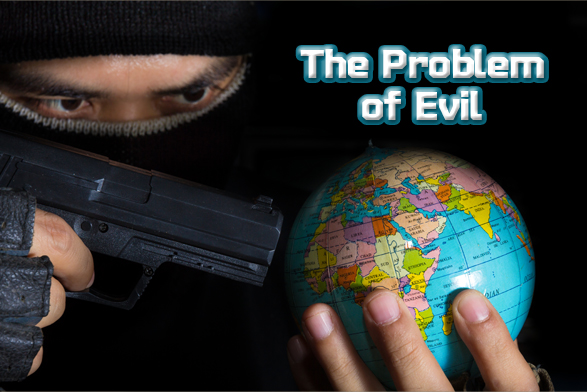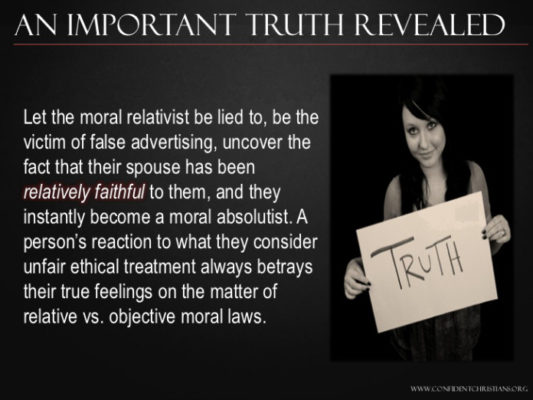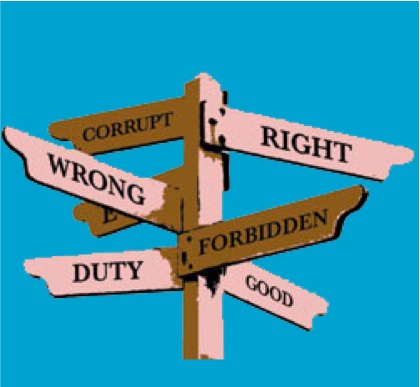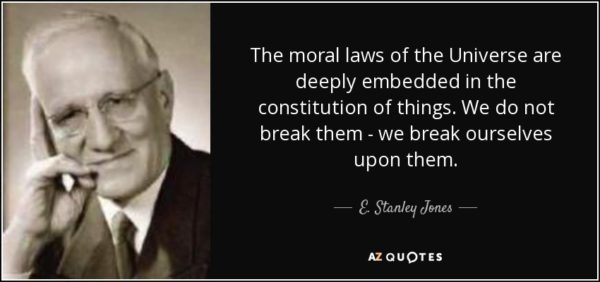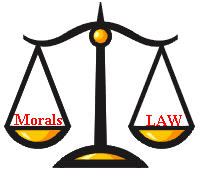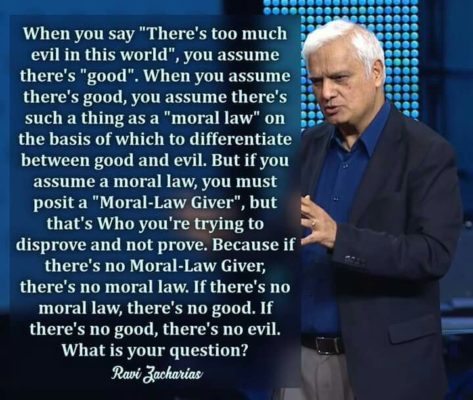Is Morality Absolute or Relative?
I was talking recently with a person about gay marriage. He asked me why I was against it. Because it’s wrong I said. I was going to go further into my answer when he said “But why should you impose your moral standards on someone else? If they want to get married, why can’t they have a right to? If you don’t like it, don’t marry a gay person.”
The issue of morality stumps a lot of Christians because nobody wants to be seen forcing their views on someone else. Some people see morality as relative, not objective. What works for me may not work for someone else we’re told.
People see our physical life being run by physical forces. All of us believe in the law of gravity. The law of gravity doesn’t depend on whether we believe it or not. It just is. It works on everybody at all times. The law of gravity is an absolute physical law.
Absolute Moral Laws
Why then when it comes to moral laws, do some people not believe in them? Because we’re unwitting heirs to a philosophy that is OK with physical laws but not moral laws. We believe physical things, like gravity, are absolutes, but moral values are a matter of personal opinion. So, we can say things like don’t impose your moral values on me but we would never say don’t impose your algebra on me.
But what if there are absolute moral laws that are just as true and reliable as physical laws? They would differ from the physical laws in that they don’t tell us what we can do but what we “ought” to do. They may not immediately affect us, but they will affect us after a while. Consider the following…
– what if someone said they will not be bound by the law of gravity? We would recommend they see a psychiatrist. The law of gravity is not wrong, but those people who reject it are.
– morality is universal. Scholars know of no culture, past or present, that does not have a moral system. Even though they may vary from culture to culture, every culture distinguishes “what is” from “what ought to be”.
– the moral differences between cultures are vastly exaggerated. All the major religions have some form of the ‘golden rule’ that says treat others the way you want to be treated. In 1993, theologian Hans Kung got a ‘parliament’ of leading representatives of the world’s major religions together. It included Jews, Christians, Muslims, Hindu’s, Buddhist’s, etc. They issued a declaration of common beliefs. It included a wide range of moral values that are held across all religious boundaries. Donald Brown’s study entitled “Human Universals” reveals more than 300 moral beliefs that are shared by all known cultures.
For example, while it may be morally permissible to lie under certain circumstances, in no culture is dishonesty upheld as a virtue. C.S.Lewis had made the same point that there are moral universals in every culture. Things like prohibition against murder without cause, rape, kindness to children, women & elders. So different cultures may disagree over how a moral principle should be applied in a given situation, but they don’t disagree on the existence of the moral standard itself.
Some of the universal moral standards are….
– prohibition against murder without cause – peace
– theft – social progress
– dishonesty – truth
– hypocrisy – willing compliance with laws
– forgiveness – accepting responsibility for personal actions
– justice – honoring agreements
– compassion
If you are confronted by moral relativist who insists all morality is relative, slap him in the face (no, don’t really). He would say it wasn’t right of you to hit him. Ask him why it isn’t right. He might say because your rights end when they affect me. Then mention to him that he’s forcing his morals on you.
When you’re confronted with a moral relativist, find a moral value that he cherishes and exploit it. You’ll find out he’s not a real moral relativist after all. His absolute moral values are just different from yours. He doesn’t want you to force your moral values on him, but he’s more than willing to force his on you.
When it comes to legalizing gay marriage, he may say it may not be right for you but who are you to force your views on someone else? Whose to say you’re right and he’s wrong? How dare you try to legislate morality? Answer him by saying why do we have laws outlawing racial discrimination? Isn’t that someone forcing their morality on you? How dare these people legislate morality?
What is the origin of our morality?
The next question is where do our moral values come from?
– some people might say that evolution has inbred these values into our psyche’s because it helps us to survive. Ask them to prove it. You’ll find that they have no proof at all. It’s just their opinion. Evolution cannot account for a father sacrificing his life to save his family, or for Christ’s maxim to love your enemies, or Mother Teresa’s lifelong dedication to the sick and dying in Calcutta, India or for any good samaritan stories. Somehow, we know what we “ought” to do even if it means sacrificing our own lives for it. We may not always do it but we know what we “ought” do to. Where does this “ought” come from?
– some people might say that you are just a collection of atoms, molecules & chemical reactions with your brain being the decision maker of all those ‘chemical reactions’. This idea is known as reductionism. That you, as a human being, are just reduced to chemical reactions in your brain. There are several things wrong with this…
a…there is no proof of it at all
b…this is saying that the decisions you make are not your own choice but are already
pre-determined by the chemical reactions in your brain.
c…if so, then you’re not responsible for your own actions. You’re just responding as your
brain chemicals tell you to.
d…if so, then you have no free will. How can someone be punished for stealing if that’s
what your brain chemicals are telling you what to do, much like a computer program
telling a computer what to do?
People who operate outside accepted moral constraints, we call criminals or psychopaths.
So, again, we’re forced with the question of where do our own moral ideas come from?
Other people will say morals are just agreed upon rules for living and getting along with other people. The problem with this is, if we made up these rules, we can also change them. So, our morality is now shaped by majority rules. So, might makes right! Then our morality becomes nothing more than how the majority feels at any given time. And the majority is forcing their views on you. But isn’t the skeptics mantra that we shouldn’t force our views on others? This is being contradictory, according to their viewpoint.
You’re also punishing people for being born in the wrong time period. Gay Marriage was illegal in the 1950’s. It’s not now. Why should we treat people differently just because they’re born in the wrong time period.
Does might make right?
But humans making moral pronouncements has another problem. It’s based on the assumption that our inner self, our consciousness, is good. Is this assumption correct? If we consult history and the great works of Western literature, the answer would be a resounding NO! In our entire history, we’ve had only about 250 years of peace, where no war has taken place. If we look into our consciousness, we find gentleness, tenderness, etc. but we also find cruelty, brutality, lust, envy, etc. Humans are a combination of good and evil. When we are given complete control over something, our bad nature always comes out. The maxim, “Power corrupts and absolute power corrupts absolutely” has been proven true time and time again. Secular morality, that assumes humans are basically good, cannot answer this point because it refuses to accept the ancient truth of Christianity, that there is corruption at the core of our being. Human nature is, in Christian terms, “fallen”. This observation need not rely on Christianity. It is derived from experience. However you define human morality, there is a universal human tendency to fall short of it. But this does fit nicely with the Christian story. Adam and Eve didn’t want to be under God’s authority, even though they were in a perfect place (Eden). They wanted to be like God. They wanted to determine what was right and good for themselves. This is the attitude that many people find themselves in today in America. We want to determine what is right and wrong for ourselves.
An example that this innate goodness of humans doesn’t work is a comparison of the American and French revolutions of the 1770’s-1790’s. The French revolution, which happened after the American one, was based on the innate goodness of humans. They erected altars to the Goddess of Reason. They embraced atheism. They did away with any Christian influence. They didn’t acknowledge the source of mankind’s rights as coming from a Creator, that these rights were inherent and inalienable. Their rights were granted by the government and what the government gives, the government can take away. They believed that man was inherently good. The American revolution believed man was inherently sinful, so we crafted our government so no one person had too much power. The French revolution had no such check on man’s nature, so it’s sinfulness took over. The protection of individual rights stood in opposition to the rights of the “collective people’. The French executed their King even after he accepted their constitution. From there, conditions rapidly deteriorated into anarchy culminating in the Reign of Terror. In just 2 years, 20,000 people were executed. Then the revolutionary leaders turned on themselves. Robespierre was guillotined in 1794. The French revolution was a grim example of how people behave when they give reign to their ‘darker/sinful nature. The British statesman, Edmund Burke, blamed France’s miseries on the revolution’s denial of God. By contrast, he called the American revolution
a ”glorious revolution”. William Penn, the founder of Pennsylvania, said, “If man is not governed by God, then he must be governed by tyrants”. At the end of the French revolution, a dictator (Napoleon Bonaparte) took over by promising a return to law and order. The American revolution was based on the imperfectability of man while the French revolution was based on the perfectability of man. The America revolution was based on God’s view of man. The French revolution was based on an atheistic view of man.
As we have shown, there is a universal moral consciousness that has been impressed upon our souls. Because we are humans, our individual cultures have deviated from this standard in many different ways. This is why our founding fathers thought that there was this universal moral law that you don’t need reason to discover it. The Declaration of Independence says that Nature’s Law is “self-evident”. When we say that this moral law exists, we mean that all people everywhere have this sense of right and wrong, what they “ought” to do. We all know that love is superior to hate and that courage is better than cowardice. There is no culture where murder is a virtue and thankfulness is a vice. Yes, some people deny, rationalize or suppress the moral law, but without it we won’t know how to react. We would only be propelled by our own self-interest. So moral relativity is ultimately unlivable. It just doesn’t work in the real world.
Suicide Statements
There are several suicide statements. These are statements that contain their own destruction. One such statement is “I can absolutely state that there are no absolutes”. Even the person who denies all moral values wants everyone to value his statement. It’s like the person who says, “Never say never” or “We should always avoid using the word always”.
A Moral law is perfect but we’re not
Now the moral law is not always the standard by which we treat others, but it is nearly always the standard by which we expect others to treat us. It doesn’t describe how we actually behave, but rather it prescribes how we ought to behave. We can only detect injustice because there’s an unchanging standard of justice written on our hearts You cannot know what evil is unless you know what good is. Without that objective standard, any objection to evil is just your opinion.
But we don’t always act in accordance with this objective morality. Many cultures have deviated from it in different ways. While no culture has held murder up as a virtue, there are cultures that consider it legal under certain circumstances. The Nazi’s considered it a proper response to keep their ‘race’ pure. They feared that polluting their race would lead to its extinction. Many Nazi’s genuinely believed this. They were sincere but they were sincerely wrong. There’s wasn’t just another morality, it was an inferior morality. But the Holy Spirit would be convicting people that this was sin. So, even a great deviation from a moral system doesn’t invalidate that system. It validates our sinfulness.
There’s also a difference in practice versus belief. Hindu’s don’t eat cows but Americans do. Some people say this is a difference in morality. Upon closer examination, it’s not. Hindu’s don’t eat meat because they believe that this cow may be a reincarnation of deceased Aunt Mary. Most Americans don’t believe in reincarnation, so we think it’s OK to eat meat. But both Hindu’s and Americans believe it’s wrong to eat a deceased Aunt Mary. So our moral is the same.
Yes, we may not have all the answers about what’s moral and what’s not in complicated situations, but we shouldn’t let that stop us from adopting a moral system. There will always be those small grey areas.
Human versus Transcendent Law
Finally, any moral system made by humans is subject to change because humans can change their minds. That’s why we need a transcendent moral system, one that doesn’t depend on humans changing their minds. But you might declare that requires a belief in God. Yes, it does. You might say that you refuse to believe in God. Then the might makes right argument wins. Would you rather be ruled by that? Then they might ask whose God should we believe in? Can you see how most things in life always get back to a belief in God? If you examine all the objective (not subjective) evidences of God in all of the world’s religions, the proofs of Christianity outweigh all the other religions. While it is not the purpose of this paper to prove that, it is nonetheless true. To see some of these proofs, go to http://BSSSB-LLC.com/video-courses-overview/prove-to-me-that-god-exists/. Being that the Christian God is the Creator of everything in the universe, including humans, He should know what we need and what is best for us, who live in a fallen world. This is why we should adopt His morality. Because we live in a fallen world, obeying His principles will be hard. But if we persevere, it’ll be the best thing for us individually and corporately as a nation. And that’s why our national morality should be based on the bible. God has promised that as we obey His commandments, He will bless us (2nd Chronicles 7:14). If we disrespect them, His hand of blessing will be removed from our country. God’s morality is the only system made directly for humans. It will never change and will always be right.
This is why the great Russian novelist, Fyodor Dostoyevsky, said, “If there is no God, everything is permitted”. Because without an unchanging absolute moral standard (that’s true for everyone at all times), there’s no reason for me to accept your standard. It’s just your opinion or preference. Why should you force your morals on me? This is why atheists must “borrow” their morality from some other religion (which is usually Christianity). Atheism, by itself, has no moral system or code. Any moral code that they have is just their own opinion or it’s borrowed. Can atheists be moral people? Of course they can. But their morality is not based on their atheism.
In Conclusion
The bottom line is without a belief in the Christian God, all morals are nothing more than some people forcing their morals on you. Since God made us, His morality is imprinted on our consciousness. Even though we deviate from it, we have a general idea of what’s right and wrong. Only by following His morality can we be assured of doing the right thing. By following His precepts, we will have a clean conscious. We will be more in line with His will for our life.
If you have any further question, please feel free to ask them. Or you can check out any of the references, especially the book ones, for much further in-depth answers.
References:
“Jesus is involved in politics” by Neil Mammen…pages 115-137
“I don’t have enough faith to be an atheist” by Geisler & Turek… pages 169-197
“What’s so great about Christianity” by Dinesh D’Souza…pages 225-283
“When skeptics ask” by Geisler & Brooks…pages 273-29
“Faith and Freedom” by Benjamin Hart…pages 304-320
https://www.reasonablefaith.org/writings/question-answer/the-moral-argument-for-god/.
https://www.youtube.com/watch?v=Rmg720wO6tY
https://carm.org/questions-on-standard-of-morality
https://carm.org/what-right-do-you-have-judge-what-moral.
For His Kingdom,
Dave Maynard
http://BSSSB-LLC.com



